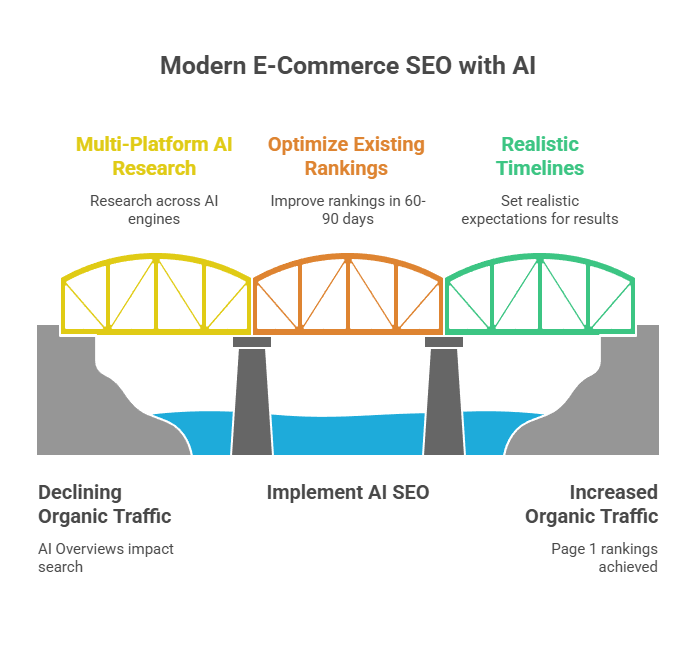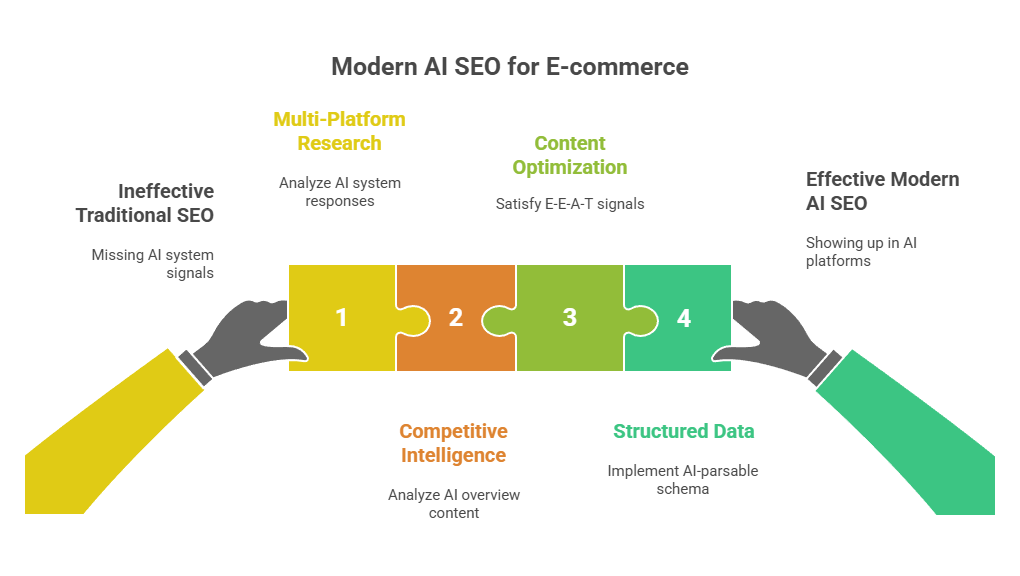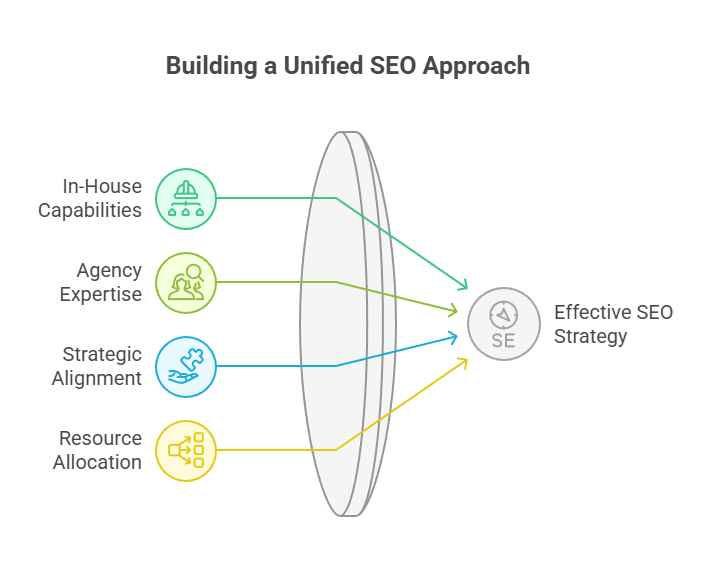Key Highlights of This E-Commerce SEO Article
Don’t have time to read the full article? Here’s what you need to know:
- Most e-commerce sites have products ranking positions 11-30 for high-volume keywords – the “page 2 goldmine” nobody talks about. These pages could reach page 1 in 60-90 days with proper optimization.
- Your organic traffic is declining because AI Overviews now appear in ~47% of searches, while most agencies still use 2019 SEO strategies that ignore AI-powered search platforms.
- Modern e-commerce SEO requires multi-platform AI research across Google AI Overviews, ChatGPT, Perplexity, and other AI engines – not just traditional keyword research and backlinks.
- The infrastructure gap is real: Most agencies lack the AI tools, workflows, and expertise to optimize for both traditional search and AI-powered platforms simultaneously.
- You can find your hidden opportunities in 5 minutes using Google Search Console – filter for pages ranking positions 11-30 with decent impressions and commercial intent.
- Realistic timelines matter: 60-90 days for moving existing rankings, 4-6 months for new content. Anyone promising page 1 in 30 days is lying.
- Schedule a no-strings-attached audit call with me to discover precisely which opportunities you’re sitting on and what it would take to capitalize on them. Book your audit call here.

Here Goes!
Position 18 for a product keyword, getting 10,000 searches per month. Seriously!
That’s what I discovered during a strategy call last week with an e-commerce company. They sell fitness and wellness products, have been working with an SEO agency for over a year, and their organic traffic has been declining for six months straight. No joke!
And they had absolutely no idea they were sitting on this opportunity.
Here’s what made this call stick with me: it wasn’t some neglected website untouched for years. They were actively paying an agency. Getting monthly reports. Seeing “progress.” But their traffic kept dropping, and nobody could explain why.
So I pulled up their Search Console data during the call. Within 5 minutes, I found three products ranking on page 2 for keywords with strong commercial intent and substantial search volume. The kind of keywords that turn into revenue, not just traffic.
That face roller I mentioned? Position 18. Their massage ball? Position 22 for a keyword getting 6,800 searches monthly. Neck massage tool? Position 27, 4,500 searches.
You know what the current agency’s strategy was for these pages? Nothing. Because they didn’t know these opportunities existed.
After that call, I started looking at other e-commerce companies we’d spoken with recently. Same pattern everywhere. Products ranking positions 11-30 for high-volume, high-intent keywords. Traffic is declining despite active SEO work. Agencies focused entirely on creating new content while ignoring the low-hanging fruit already on the tree.
This isn’t just one company’s problem. This is systemic. And if you’re running an e-commerce site right now, there’s a decent chance you’re in the same boat.
The Wake-Up Call Most E-Commerce Companies Are Missing
Let me be direct about what’s happening in e-commerce search right now.
Your organic traffic is probably declining. Not because your products got worse. Not because your website broke. Not even because your SEO agency stopped working.
It’s declining because the entire search landscape has shifted, and most agencies are still operating as if it’s 2019.
Here’s what changed: AI Overviews now appear in roughly 47% of searches. That’s up from about 25% just six months ago. For e-commerce and informational queries? Even higher. Zero-click searches where people never leave Google? Approaching 60%.
So even if you’re ranking on page 1, you’re getting fewer clicks than you used to. The pie got smaller for everyone.
But here’s the part that keeps me up at night – and why that strategy call haunted me for days: most e-commerce companies don’t realize they’re sitting on immediate opportunities that could partially offset this traffic decline.
Pages already ranking. Already indexed. Already deemed relevant by Google. Just stuck on pages 2-3, where nobody sees them.
Let me show you how to find out if you’re one of them.
The Five-Minute Self-Audit That Reveals Your Hidden Opportunities
Open Google Search Console right now. I’m serious – stop reading and open it. I’ll wait.
Set your date range to the last three months and filter out search terms between positions 11 and 30.
Now look at what comes up.
You’re looking for pages with three characteristics:
- Average position between 11-30
- Decent search volume (at least a few hundred impressions monthly)
- Commercial intent (product pages, category pages, anything someone searches when ready to buy)
Here’s what you’re probably seeing: product pages that already rank. Keywords with real search volume. Opportunities your current agency never mentioned in their monthly reports.
Why? Because most agencies don’t look for this. They’re focused on building new content, earning backlinks, and improving Domain Authority. All important, sure. But they’re missing the pages that could move to page 1 in 60-90 days with the proper optimization.
You know what position 18 means for an e-commerce product page? It means Google trusts your site enough to rank you. Your page is relevant. You’re just not quite good enough yet to crack page 1.
That’s fixable. Usually faster than building entirely new content.
Why Your Current Agency Can’t Fix This (Even If They Wanted To)
Now for the uncomfortable part.
The agency you’re paying right now? There’s a good chance they literally cannot do what modern e-commerce SEO requires. Not because they’re lazy or incompetent. Because they don’t have the infrastructure.
Let me explain what I mean by “2019 SEO” – and why it’s failing you.
What 2019 SEO Looks Like
Your agency probably delivers some version of this monthly:
- Keyword research (from SE Ranking, SEMrush, or Ahrefs)
- Content recommendations (“you should write about these topics”)
- Technical fixes (speed optimization, schema markup)
- Backlink outreach (manual email campaigns to get links)
- Monthly ranking reports
Solid fundamentals. That’s not the problem.
The problem is what’s missing: modern AI research and optimization for the platforms that now control 40-50% of how people search.
When someone searches for “best face roller for wrinkles,” they’re not just seeing Google’s traditional results anymore. They’re seeing an AI Overview at the top that synthesizes multiple sources. They might ask ChatGPT instead of Google. They might use Perplexity to research products.
If your content isn’t optimized for these AI-powered search experiences? You’re invisible in roughly half of all searches.
What Modern AI SEO Actually Requires
Here’s what proper e-commerce SEO looks like now – and I want you to ask yourself honestly whether your current agency is doing this:
Step 1: Multi-Platform Research
Before touching any content, we need to understand what AI systems are saying about your products. That means:
- Analyzing Google’s AI Overviews for target keywords
- Checking ChatGPT’s responses to product-related queries
- Reviewing what Perplexity surfaces for comparison searches
- Understanding how Gemini and Claude answer relevant questions
Why? Because AI systems don’t just regurgitate Google rankings. They synthesize information differently. They value different signals. And if you’re not showing up in their training data or meeting their quality thresholds, you don’t exist in these platforms.
This research takes 4-6 hours per product page or category page. Most agencies don’t have the tools or workflows to do this efficiently.
Step 2: Competitive Intelligence Beyond Rankings
Traditional competitive analysis looks at who ranks where. Modern analysis looks at:
- What content appears in AI Overviews for target keywords
- Which brands’ AI systems cite as authoritative
- What questions do AI platforms answer that traditional search doesn’t
- Where the gaps exist between what AI provides and what searchers actually need
Step 3: Content Optimization for Both Humans and AI
This is where it gets technical. You need content that:
- Satisfies E-E-A-T signals (Experience, Expertise, Authoritativeness, Trustworthiness)
- Uses natural language AI systems to understand
- Includes specific product details that AI can extract and cite
- Addresses questions people ask AI assistants
- Maintains readability and conversion focus for humans
Writing for both search engines and AI engines? That’s an entirely different skillset than writing for Google alone.
Step 4: Structured Data That AI Actually Uses
Schema markup for e-commerce companies matters more now than ever. But not just any schema – you need structured data that AI systems can parse and understand for product information, reviews, pricing, and availability.
Most agencies add basic schema and call it done. That’s not sufficient anymore.

The Infrastructure Gap
Here’s the real issue: all of that requires AI tools, workflows, and expertise that most traditional agencies don’t have.
We built our own AI SEO agent (BSM Copilot) specifically for this work. Took six days of intensive prompt engineering and another week of development. It compresses what used to take 11-15 weeks of manual research into hours of AI-assisted work.
That’s our competitive advantage. We invested because we had to – we lost 80% of our traffic in a 2021 core update and had no choice but to innovate or die.
Most agencies haven’t made that investment. They’re still operating with the same tools and workflows they used five years ago. And those tools don’t cut it in an AI-first search landscape.
How to Evaluate Your Current Agency
Ask them these specific questions:
- “What’s your process for analyzing AI Overviews for our target keywords?”
- “How are you optimizing our product pages for ChatGPT and Perplexity visibility?”
- “What AI tools or workflows do you use in your research and content optimization?”
- “Can you show me how our products appear in AI search responses versus traditional Google results?”
- “What’s your timeline for moving a product page from position 18 to page 1?”
If you get vague answers or if they pivot to talking about backlinks and Domain Authority, you have your answer. They’re not equipped for modern AI SEO.
That doesn’t make them bad people. It makes them equipped for a search landscape that no longer exists.
What It Actually Takes to Move the Needle
Let’s talk about what modern e-commerce SEO actually requires – and more importantly, what realistic timelines look like.
Because the most significant source of frustration I see? Mismatched expectations. Agencies promise “fast results” to win clients. Clients expect rankings in 30 days. Nobody’s happy when reality hits.
So here’s reality.
The Low-Hanging Fruit Timeline: 60-90 Days
Remember those pages already ranking positions 11-30? Those are your fastest wins.
Why? Because Google already trusts your site enough to rank you on page 2-3. You’re not starting from zero. You need to improve the page enough to jump from “pretty good” to “good enough for page 1.”
What that optimization looks like:
- Comprehensive AI research across multiple platforms
- Content enhancement based on what AI systems value
- Structured data improvements for better AI parsing
- Technical optimization for page experience
- Strategic internal linking to boost page authority
Timeline: 8-12 weeks to see meaningful movement. Sometimes faster if the competition is weak. Sometimes slower if your page needs significant content improvements.
But we’re talking about moving existing rankings, not building new ones from scratch. That’s fundamentally faster than creating new content that has to earn trust from zero.
The New Content Timeline: 4-6 Months
Creating new product pages or category pages that rank from scratch? That’s a minimum 3-4 month timeline. Anyone promising faster is either very lucky or very dishonest.
Why so long? Because Google doesn’t immediately trust new content. AI systems need time to encounter your content, verify its accuracy against other sources, and build confidence in citing it.
You can accelerate this with:
- Strong E-E-A-T signals from the start
- Strategic digital PR to get authoritative mentions
- Consistent publishing that demonstrates expertise
- User engagement metrics that prove value
But even with perfect execution, you’re looking at months, not weeks.
The Ongoing Maintenance Reality
Here’s what nobody tells you: SEO is never “done.”
Search landscapes shift constantly. Competitors improve their content. AI systems evolve in how they evaluate and cite sources. Google releases algorithm updates.
You need ongoing optimization, not a one-time project. That means:
- Monthly analysis of ranking movements and AI visibility
- Quarterly content refreshes based on new AI insights
- Regular technical audits as platforms evolve
- Continuous competitor monitoring
Budget for this. If an agency tells you SEO is a one-time project, they’re either lying to get your business or fundamentally don’t understand how search works.
The Question Nobody Wants to Answer: Can You Do This In-House?
I’m going to level with you about something most agencies won’t say.
Some parts of modern SEO you can absolutely handle in-house. Other parts? You need expertise and infrastructure you probably don’t have.
Let me break this down honestly.
What In-House Teams Can Handle
If you’ve got a competent content person and a decent technical resource, you can manage:
- Basic keyword research using standard tools
- Content creation following a solid brief
- Technical fixes once you know what needs fixing
- Schema implementation with good documentation
- Performance tracking in Google Search Console and Analytics
This is table-stakes stuff. If you’re outsourcing this and your agency executes, you’re probably overpaying.
What Requires Serious Expertise
Here’s where it gets harder:
- AI-first research across multiple platforms (ChatGPT, Perplexity, Claude, Gemini)
- Strategic content architecture for both humans and AI
- Advanced technical SEO (especially for large e-commerce sites)
- Interpreting complex ranking patterns and algorithmic shifts
- Understanding nuanced E-E-A-T signals, AI systems evaluate
You can learn this stuff. People do. But it takes time, and the landscape changes fast enough that by the time you master one aspect, three new ones have emerged.
The Real Calculation: Build vs. Buy
Here’s the math you need to run:
Building in-house AI SEO capability requires:
- Hiring someone senior enough to have modern expertise (not cheap)
- Investing in AI tools and platforms (ChatGPT, Claude, Perplexity, plus SEO tools)
- Time for that person to audit your site and build a strategy
- Accepting that one person has a limited capacity for research and implementation
Working with a specialized agency means:
- Immediate access to proven AI infrastructure and workflows
- Team capacity without hiring headcount
- Expertise across multiple client scenarios and industries
- Faster implementation because systems already exist
Neither option is universally better. It depends on your scale, budget, and how strategic SEO is to your business model.
But if you’re going to build in-house, commit to actually building it right. Please don’t hire a mid-level person, give them basic tools, and expect AI SEO mastery. That’s setting everyone up for failure.
The Hybrid Approach That Often Works Best
Honestly? Most successful e-commerce companies use a hybrid model:
In-house team owns:
- Overall strategy and business priorities
- Day-to-day content execution
- Technical implementation of recommendations
- Performance monitoring and reporting
Agency provides:
- Advanced AI research and insights
- Strategic content architecture and briefs
- Technical auditing and roadmapping
- Expertise when algorithm updates hit
This combines control with expertise. You’re not wholly dependent on an agency, but you’re not trying to build everything from scratch either.

The Path Forward: What to Do Tomorrow
Look, I could end this with a generic “contact us” pitch. But that’s not useful to you right now.
Instead, here’s what you should actually do – whether you work with us or not.
Immediate Actions (Do This Week)
1. Run the Google Search Console audit I described earlier
Pull up those pages ranking positions 11-30. Sort by impressions to find the highest-volume opportunities. Make a list of your top 10 pages that meet this criteria.
2. Test your products in AI search
Open ChatGPT, Perplexity, and Claude. Search for product-related queries your customers would ask. See if your products show up. If they don’t, you have a visibility problem in AI search.
3. Have the complicated conversation with your current agency
Ask them the evaluation questions I provided earlier. Their answers will tell you everything you need to know about whether they’re equipped for modern SEO.
30-Day Actions (If Staying With Current Agency)
If you decide to stick with your current agency, demand these specific deliverables:
1. AI visibility audit
They should analyze how your top products appear (or don’t appear) in AI Overviews, ChatGPT, Perplexity, and other AI search platforms. If they can’t deliver this, they’re not doing AI SEO.
2. Low-hanging fruit opportunity report
They should identify your pages ranking positions 11-30 with commercial intent and volume, prioritized by expected impact. This should be a standard part of any SEO audit.
3. Modern optimization roadmap
They should present a plan specifically for improving AI search visibility, not just traditional rankings. If their roadmap looks identical to what they would have recommended in 2019, that’s a red flag.
Give them 30 days to deliver this. If they can’t, or if what they provide feels generic and templated, you need to have a serious conversation about whether this partnership makes sense.
90-Day Expectations (Realistic Timeline)
Whether working with your current agency or switching to someone new, here’s what realistic success looks like in the first 90 days:
Month 1:
- Complete AI visibility audit
- Identify and prioritize low-hanging fruit opportunities
- Begin optimization of highest-priority pages
- Implement improved structured data
Month 2:
- Continue optimization rollout across priority pages
- Monitor ranking improvements for optimized pages
- Begin seeing early movement on some keywords
- Refine approach based on initial results
Month 3:
- Measure meaningful traffic improvements from optimized pages
- Identify additional opportunities based on what’s working
- Scale successful approaches to more pages
- Establish ongoing optimization cadence
You should see measurable improvement within 90 days if you’re working with competent people and focusing on the right opportunities. Not “full transformation” – that takes longer. But clear directional improvement.
If you’re three months in and seeing nothing? Something’s fundamentally wrong.
See the Full AI SEO Methodology in Action
Want to see exactly how modern AI SEO works? I walk through the complete methodology – including how to find these page 2 goldmines, analyze AI Overviews, and optimize for both traditional and AI-powered search – in our comprehensive AI SEO webinar.
Watch the full recording:
In this 60-minute session, our COO, Daniel Burns, and I demonstrate the actual tools, workflows, and strategies we use for clients. You’ll see real Search Console data, live AI research across multiple platforms, and practical optimization techniques you can implement immediately.
When to Switch Agencies
Here are the clear signals it’s time to find new SEO partners:
1. They can’t articulate their AI SEO methodology
If they’re vague about how they optimize for AI Overviews, ChatGPT, and other AI platforms, they don’t have a methodology. They’re figuring it out on your dime.
2. They focus on vanity metrics instead of business outcomes
Domain Authority, total backlinks, keyword rankings without context – these don’t pay your bills. Revenue from organic search does. If they can’t connect their work to business impact, they’re not strategic enough.
3. They’ve never identified your low-hanging fruit
If you ran that Search Console audit and found pages ranking 11-30 that your agency never mentioned, they’re not looking at the correct data.
4. Timeline mismatches keep happening
They promised fast results. Reality took longer. They make excuses. This pattern won’t improve. It’s a fundamental dishonesty problem.
5. You don’t have direct access to senior expertise
If you’re working with junior account managers who “escalate questions” to people you never talk to, you’re not getting the expertise you’re paying for.
Look, switching agencies is disruptive. There’s onboarding time, knowledge transfer, and a period where things might temporarily plateau. But if you’re already not seeing results, the disruption is worth it to work with people who actually understand modern search.
Want to Know What Opportunities You’re Actually Sitting On?
I’ve laid out the problem, explained what modern AI SEO strategies require, and given you frameworks for self-diagnosis. But here’s what I can’t do in an article: look at your specific site and tell you exactly which products are your most significant opportunities and what it would take to move them to page 1.
That’s what the audit call is for.
Schedule a no-strings-attached audit with me where I’ll personally:
- Pull up your Search Console data and identify your page 2-3 goldmines
- Check how your products appear (or don’t appear) in AI Overviews, ChatGPT, and Perplexity
- Show you specifically which pages have the fastest path to page 1
- Give you an honest assessment of whether your current agency can execute modern AI SEO
- Outline what a realistic optimization plan would look like for your business
No pressure. No hard sell. Just an honest conversation about what you’re sitting on and what your options are for capitalizing on it.
Some people book the call and decide to stay with their current agency, but with clearer direction on what to demand. Others realize they need a different partner and we discuss what working together would look like. Both outcomes are fine with me.
The goal is clarity – helping you understand your situation well enough to make a wise decision about what to do next.
No-Pressure Next Step
I offer complimentary audit calls where I personally review your site, identify opportunities, and provide honest advice on what you should do next.
Sometimes that advice is “work with us.” Sometimes it’s “your current agency is fine, just push them to focus on these specific things.” Sometimes it’s “honestly, you can handle this in-house if you hire the right person.”
I’m not interested in clients who aren’t a good fit. That wastes your time and mine. I’d rather have a 30-minute honest conversation where I help you understand your situation clearly, even if you never become a client.
During the call, I’ll:
- Pull up your Search Console and show you your page 2-3 opportunities
- Check your AI search visibility across multiple platforms
- Give you specific recommendations based on your situation
- Answer questions about modern AI SEO honestly
- Help you understand whether your current agency can deliver what you need
No sales pitch. No pressure. Just a conversation about what’s actually happening with your search visibility and what realistic options you have to fix it.
Book your complimentary, no-strings-attached, audit call here.
If that sounds useful, book a time or reach out directly. Let’s figure out what opportunities you’re sitting on.
I’ve been doing this work since before Google was called Google. I’ve seen multiple major shifts in how search works. This AI transition is the biggest one yet – bigger than mobile, bigger than voice search, bigger than any algorithm update.
The agencies and businesses that adapt will thrive. The ones that pretend things haven’t changed will slowly bleed traffic and revenue until they’re forced to confront reality.
Which side of that divide do you want to be on?
Cheers,
Chris
